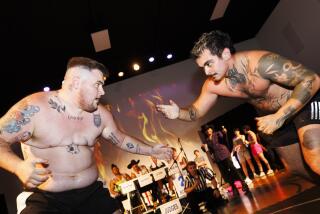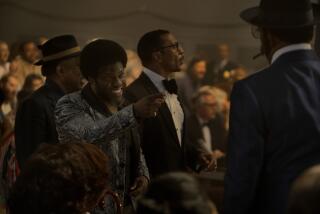Prison rodeo offers hope where it is lacking
ANGOLA, La. — In the middle of the rodeo arena, the four men could smell manure from the animal pens and cracklins and caramel corn from the stands as they steadied themselves in their plastic lawn chairs, spread their hands on the red card table in front of them and planted their feet in the mud.
They were bracing for the bull.
Once it was turned loose, the last one sitting in this game called Convict Poker would win.
They looked almost identical in their black helmets, protective vests and striped uniforms. The one known as Timmy Lo said a silent prayer. Juggernaut hoped his injured ankle wouldn’t slow him down if he had to run for it. The man next to him, Tiger, wanted to reclaim the title. The last one, Bucket Head, longed to make his family proud.
Each wanted the $250 in prize money and the big belt buckle proclaiming the wearer champion. But as the crowd of 11,000 watched the four men as they competed at the country’s longest-running prison rodeo, each wanted something more: a little bit of respect.
“All the stories they might have heard — ‘These are animals!’ When I’m in the arena, I’m not a demon with a pitchfork — I’m me,” Todd “Tiger” Plaisance said as he unloaded horses in the cool sunshine before the gates opened one Sunday last month. He was wearing his championship Convict Poker belt buckle from 2010.
Louisiana State Penitentiary was once a plantation, Angola, named for the origin of its slaves. Inmates work the fields for 2 cents an hour at what is now the largest maximum-security prison in the country, an 18,000-acre compound about 50 miles north of Baton Rouge that’s home to the state’s death row and more than 6,200 other prisoners, many of them murderers, armed robbers and rapists (who aren’t allowed at the rodeo).
Through sales of tickets, food and prisoner-made crafts, the rodeo, held twice a year, helps pay for the prison’s educational reentry programs. This fall, it will generate about $2.5 million.
“It brings the taxpayers in to see they can really change people’s lives,” warden Burl Cain said. “Most places just lock and feed. Our greatest challenge is to give people hope who don’t have hope — that’s what this rodeo does.”
Hope is often in short supply at Angola. About 80% of prisoners don’t receive visits, the warden said. About 95% of the inmates will die here, many buried in inmate-made wooden coffins in a potter’s field on prison grounds.
But each April and October, they can be stars in what’s billed as “The Wildest Show in the South.” (Inmates often get injured, though no one has been killed.)
“Ladies and gentlemen,” the announcer boomed, “you’re going to see a lot of things here you won’t see anywhere else.”
There are conventional rodeo events, such as bull riding, but also competitions for those city boys who, though short on roping or riding skills, have plenty of nerve. In Guts & Glory, inmates try to snatch a red disc tied to the horns of the meanest, toughest 2,000-pound cross-bred bull available.
And then there’s Convict Poker.
Travis “Bucket Head” Johnson, 33, said some inmates believed certain competitors were protected by an invisible force field, “like an aura.” Johnson won Convict Poker in April, but thinks that had more to do with will than magic.
“You got to make up your mind how bad you want it,” Johnson said.
He scanned the rodeo program.
“That’s a tough table,” Johnson said of his competition. “We’re gonna let the bull decide who comes up a winner and who gets a little dirt in his shirt.”
The winner of today’s contest would advance to the finals a week later.
Some spectators said they sympathized with the men in the arena, even though they were unaware of their crimes: Timothy “Timmy Lo” Gay and Casey “Juggernaut” Weeks were doing time for armed robbery, Johnson and Plaisance for murder.
“I can’t imagine those inmates sitting at that table how they feel, because my heart’s pounding in the stands!” said office manager Teresa Kolder, 48.
Terri Johnson, 51, a hospital worker who brought her family, said: “It’s more exciting because they’re not professionals. I think they’re crazy sitting there waiting for the bull to hit them.”
Down in the arena, as Timmy Lo, Juggernaut, Tiger and Bucket Head waited their turn, the first four inmates took their seats at the red card table. An enormous black bull exploded from the chute and went straight for the men, tossing the table and its occupants like a house of cards.
No one was seriously injured.
“What do you think about Convict Poker?” the announcer shouted. The crowed erupted with cheers and applause.
Seats at the table are assigned. Weeks, 39, would have his back to the chute when the bull emerged — the most dangerous seat.
“It’s not a skill — it’s the luck of the draw,” Plaisance said. “You just hope the bull don’t knock you out of the chair. One time I felt the bull’s breath on my neck, then I was up in the air.”
Plaisance, 38, was sent to Angola in 2000. He works herding cattle at the prison on a palomino called Iron Mike, and has competed most years since 2000. To participate in the rodeo, inmates have to keep a clean record.
“I missed a couple years — I was a bad boy,” he said.
Gay, 37, is another rodeo veteran. He ruptured his groin in a fall during the bareback horse competition at his first rodeo in 2001, but won the event. This would be his first time trying Convict Poker.
“I might be the one to get hit,” said Gay, a wiry, quiet man with darting eyes. But on the other hand, he said, “they say a lot of people, the first time they do it, they win.”
Gay is a Baptist, and likes to pray before he enters the ring. He dedicated this rodeo to his father, who died in May. Few family members still visit him.
Johnson, a short, muscular man wearing a beard and his first cowboy hat, has been competing since he came to the prison in 2001. This time, he was expecting his mother, sister and other relatives to come and watch — not necessarily a good thing.
“When they come, I usually get banged up,” he said, smiling ruefully and exposing teeth replaced after they were knocked out during a past rodeo.
Weeks, who started serving his sentence in 2000, had another cause for concern: His left ankle was swollen, kicked by a horse during field duty a week earlier. He is solidly built, but if the bull charged, he might not be able to get away in time. His shaved head was already sweaty.
Wranglers on horseback drove the black bull back into the chute. “Would you like to see that again?” the announcer asked.
More applause. Time for a second hand of Convict Poker.
Weeks, Gay, Johnson and Plaisance took their seats at the card table. The chute opened.
This time, the bull veered away from the table, but two rodeo clowns taunted the massive animal back. Clearly annoyed, it charged toward the inmates, sweeping a chair — and his shot at the Convict Poker title — right out from under Plaisance.
For a second, Plaisance remained in place, as if sitting on an invisible chair. In frustration he snapped his arm downward, as if throwing something to the ground, and hustled out of the ring.
Three left.
The bull darted away again, but quickly returned, trampling the table and tossing Johnson up … onto Gay.
Johnson was out.
Gay was on the ground, but still technically in contention because he was at the table — until he got up moments later and fled the bull.
Weeks, still sitting by the remnants of the table, had won. But he didn’t keep his seat for long.
The bull charged. Weeks stumbled as fast as he could on his swollen ankle, the bull right on his heels, trailing red bits of the splintered card table. Weeks reached the metal railing and pulled himself to safety.
Afterward, covered in sweat, Weeks said he was proud of the win because “it was clean,” although he chalked it up mostly to luck.
“You got to have some nerves,” he allowed.
Perhaps more important, Weeks had hope. Gay, Plaisance and Johnson were serving life sentences. But Weeks is serving a 34-year sentence, eligible for early release in 2028 — years away, yes, but he could at least plan for his freedom.
He didn’t have any family come to watch his win, but they had visited a few weeks earlier, and he has a 17-year-old daughter waiting on him in Lafayette. He’s taking classes in the prison’s reentry program.
As spectators filed out and inmates assembled in the rodeo ring at dusk to be counted and escorted back to their cell blocks, Weeks was optimistic, despite his aching ankle. Next week at the championship, “Buckle Sunday,” he would compete again, this time for the overall Convict Poker buckle.
“I hope I get a good seat.”
He did. And he got his buckle.
More to Read
Sign up for Essential California
The most important California stories and recommendations in your inbox every morning.
You may occasionally receive promotional content from the Los Angeles Times.











